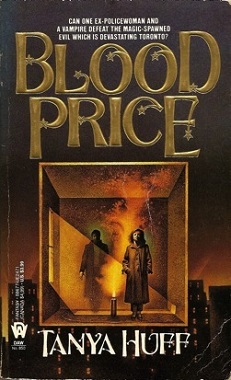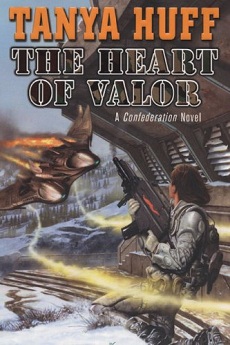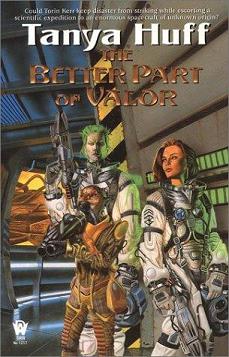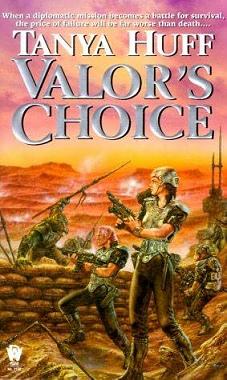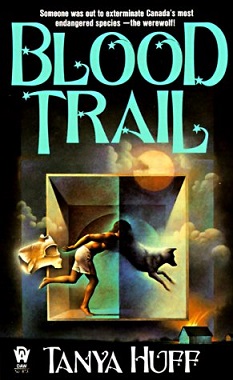
Blood Trail
Tanya Huff
304 pages
published in 1992
What do you call urban fantasy when it moves to the countryside? Because that’s what happens in Blood Trail as Vicky Nelson, ex police officer turned private dick and her vampire partner Henry Fitzroy trade the familiarity of Toronto for the charming wonders of the Canadian countryside. Vicky had met Fitzroy in the first novel of the Blood series, Blood Price, now in the second — as seems to be de rigeour in urban fantasy — she gets involved with werewolves. But these aren’t your average, shirt ripping, feauding with vampires werewolves: these are sheepfarmer werewolves, leading a quiet existence near London, Ontario, just another Dutch-Canadian family. Until somebody starts killing them, somebody who seems to know that they’re werewolves.
Which is when they call Henry Fitzroy, who first met the Heerkens wolf clan during WWII, when he was a member of the British secret service and they were in the Dutch resistance. Because the wer could obviously not involve the police without their secret getting known and since they’re mistrustful of outsiders anyway, Henry was their only option. And Henry of course in turn wanted Vicky to come along and use her investigative talents. Meanwhile, back in Toronto detective Mike Celluci, Vicky’s ex-colleague and still occasional love interest is convinced Henry is hiding something. Of course not knowning he’s a vampire, it may just be jealousy that’s driving his investigation…
The plot driving Blood Trail is on the slight side; though Huff does her best to mislead, it’s clear quickly who the killer is and what their motivations are. Motivations which, in their religious origins are a bit cliched to be honest, even for a novel first published in 1992. But then the plot isn’t the real point of this novel and series anyway, but there just to provide a scaffolding for the continuing adventures of Vicky, Henry and Mike and their relationship to each other. It’s a classic love triangle, with Vicky and Henry lusting after each other but wary of consumation, while Vicky and Mike dive in the bed whenever they’ve had a good fight.
There’s always an erotic charge to vampirism of course, what with all those aristocratic men drinking the blood of various sultry beauties, not always involuntarily. In Blood Price Huff already had Henry drink Vicky’s blood, but at the time it was for a purely practical reason, to enable him to defeat the big bad. Since then they neither had sex nor had Henry fed again on her, though both wanted it; the circumstances hadn’t been right. All part of that slow dance of attraction between the heroine and vampire in novels like this; less common perhaps is having Henry not only feed, but share the bed with Tony, a young streetwise protege of Vicky’s. This sideplot was never really followed up here, nor had Vicky much of a response to this.
With Vicky and Mike things are much more casual, colleagues turned lovers, though not in lover. Or at least that’s what they’re telling each other. Because Mike doesn’t know what and who Henry really is, his inexplicable to Mike relationship with Vicky makes him suspect. Which is why Mike comes butting in on her investigation: suspicion fueled by jealousy. Mike in general is a bit of a bull in a chinashop, very different from the urbane Henry.
Central to Vicky’s relationship with both men is her progressivily worsening disability, her blindness at night and at low light. She’s still trying to come to terms with it, while not wanting it to define her or admit to her weaknesses, especially not in front of either Herny or Mike. I found this to be the most realistic part of Vicky’s character.
What Blood Trail also does well is the nature of the werewolf pack. It’s clear that the werewolves are not quite human even apart from being able to turn into wolves; the relations between the members are wolf like already and they seem slightly less bright, more impulsive than “normal” humans. Their murderer uses those qualities against them and it’s only Vicky, Henry and Mike’s outsider perspective that enables them to track him down.
Blood Trail does suffer somewhat from being a series book, with slow moving subplots and the slow moving evolving relationships between the three main characters. Read on its own it’s therefore not quite satisfying; you want to have read the previous novel. As popcorn reads these books are great, but don’t expect anything profound.
